The program of the anniversary event traced the development of the department for “Innovation and Entrepreneurship Research” and the interdisciplinarity at the Institute. The archive reports on the appointment of Dietmar Harhoff and subsequent renaming of the Institute as the “Max Planck Institute for Innovation and Competition” tell the story of the department, to which reference was made.
After introductory words by Prof. Dietmar Harhoff, Ph.D., a panel discussion was held in which a decade of progress in the research field and the department was reflected upon. The panel discussion was moderated by Dr. Zhaoxin Pu (DataGuard), who herself completed her doctorate at the Institute in 2020, and at present works for a company specializing in data protection, information security, and compliance.
Prof. Dr. Fabian Gaessler, now Assistant Professor at Universitat Pompeu Fabra in Barcelona, showed in his contribution how research at the interface of management, economics, law, and computer science, leads to a “cross-pollination”, so to speak, with an input of doctoral students from various institutions and a throughput of postdocs from renowned research institutions (EPFL, Cornell University, ZEW, KAIST, Northwestern University, Mines Paris Tech, University of Cape Town, Goethe University and many more). This qualifies for positions in various sectors and has led the former Research Fellows into industry, start-ups and spin-offs (octimine technologies), or to EPO, bidt, and other research institutions (e.g., KU Leuven, Erasmus University, Politecnico di Milano, Bocconi University, University of Groningen, Ingolstadt University of Technology, Bundeswehr University).
Prof. Laura Rosendahl Huber, Ph.D., who is now Assistant Professor at the Rotterdam School of Management and is, inter alia, conducting research on gender differences, portrayed the development of the department into an increasingly diverse and international team in her presentation of photos and memories.
Prof. Bronwyn Hall, Ph.D., Emerita Professor at the University of California Berkeley, and Affiliate of the department, examined the department’s publication figures and noted a constantly growing publication output.
Dr. Matthias Lamping, Senior Research Fellow, gave an entertaining account of the expectations of the legal colleagues that were associated with the establishment of an economics department. It quickly became apparent that interdisciplinarity cannot be established at the push of a button, but that ideas on common research questions grow together through continuous dialogue.
Dr. Alexander Suyer, also a former doctoral student of Dietmar Harhoff and now Research Coordinator at the Institute, started with the Institute’s Mission Statement to reflect on Dietmar Harhoff's many years of engagement in evidence-based policy advice at the national and federal state level.
In his speech, Prof. Dr. Josef Drexl expressed in particular appreciation for the colleague, scientist, and person Dietmar Harhoff.
Very refreshing and impressive were the subsequent “elevator pitches”, short presentations by young researchers from both the economics and law departments of the Institute, which ranged from core innovation and patent research to gender issues in innovation and entrepreneurship, digital markets, platforms and artificial intelligence to green tech, and showed that the young scientists have grown and settled in interdisciplinary exchange.
In an interactive memory lane game, the Junior Research Fellows Ann-Christin Kreyer and Timm Opitz then presented surprising, interesting, and amusing facts and figures that required the knowledge and judgment of those present.
A special surprise was presented at the end of the afternoon event: In a video greeting, the Federal Minister of Education and Research Bettina Stark-Watziger honored the ten-year anniversary of the department for “Innovation and Entrepreneurship Research” as well as Dietmar Harhoff personally as a “particularly influential voice for innovation and competition” who was and is heard by policymakers.
At the subsequent reception in the Institute’s Grand Hall, attendees were invited to step into the time machine, and look at the project posters from the first poster session in 2013, which were set up in order to trace the significant changes and developments of the last ten years in terms of both subject matters and persons.
The evening dinner event, which was dedicated to the exchange between the Alumni and Alumnae of the economics department and the current team, was introduced by piano music in the Max Planck Hall of the Akademischer Gesangverein München (Academic Choral Society), which Max Planck joined at the age of 16 – a lesser-known facet of his talents. Dietmar Harhoff was thanked by his team with a special gift based on the idea and initiative of Senior Research Fellow Dr. Marina Chugunova, who researches human-machine interactions, inter alia: an image generated by artificial intelligence fed with prompts from the team. The fact that humans are still indispensable for achieving outstanding creative results was demonstrated by the commitment of Sebastian Erhardt, also known as “SebGPT”, who gave the result an extra boost.
Special thanks for her commitment and creativity in organizing the event went to Junior Research Fellow Svenja Friess.
More:
Video Greeting (in German) of the Federal Minister of Education and Research Bettina Stark-Watzinger
LinkedIn Post on the event by Prof. Dr. Claudia Lieske (Technische Hochschule Ingolstadt)

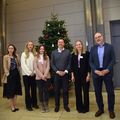
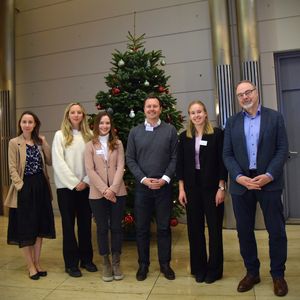
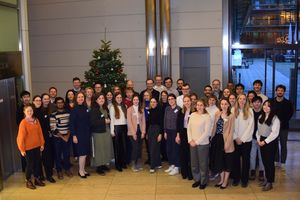



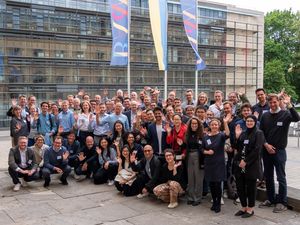


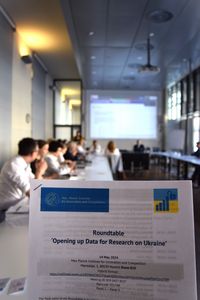
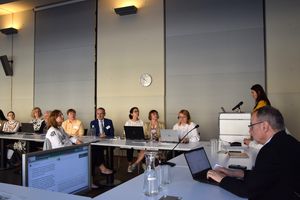



![[Bitte nach "english" übersetzen:] AI-generated image to celebrate the 10th anniversary of the economics department of the Max Planck Institute for Innovation and Competition](/fileadmin/_processed_/0/7/csm_DH_65_a9841dab23.png)
![[Bitte nach "english" übersetzen:] AI-generated image to celebrate the 10th anniversary of the economics department of the Max Planck Institute for Innovation and Competition](/fileadmin/_processed_/0/7/csm_DH_65_3b8e8403f9.png)


![[Bitte nach "english" übersetzen:] Blick ins Veranstaltungspublikum](/fileadmin/_processed_/2/3/csm_IER_10_3_DSC_0522_21511e862c.jpg)












![[Bitte nach "english" übersetzen:] Group picture WOEPSR 2023](/fileadmin/_processed_/b/5/csm_WOEPSR23_Auswahl_Gruppe_4ad07e35bd.jpg)
![[Bitte nach "english" übersetzen:] Group picture WOEPSR 2023](/fileadmin/_processed_/b/5/csm_WOEPSR23_Auswahl_Gruppe_51351208cc.jpg)
![[Bitte nach "english" übersetzen:] Kick-off WOEPSR 2023. f.l.t.r. Dietmar Harhoff, Michael E. Rose, Hanna Hottenrott](/fileadmin/_processed_/d/e/csm_WOEPSR23_Kickoff__Foto_Thomas_Schaper__2b52c88694.jpg)
![[Bitte nach "english" übersetzen:] Audience WOEPSR 2023](/fileadmin/_processed_/5/8/csm_WOEPSR23_Plenum_DH_dc7102c39b.jpg)
![[Bitte nach "english" übersetzen:] Audience WOEPSR 2023](/fileadmin/_processed_/f/b/csm_WOEPSR23_Plenum_Bronwyn_51cbc825ca.jpg)

